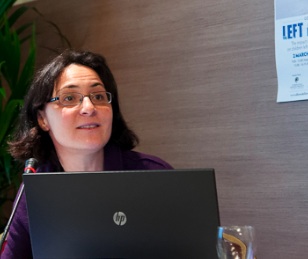CONFERENCE | by Camilla Azzini
Left Behind – Brussels Conference: Flavia Piperno
 Biographical note:
Biographical note:
Flavia Piperno is researcher at CeSPI-Center of Study on International Policy where she carries out research on the nexus between international migration, development cooperation and social policies. At CeSPI, since 2007, she coordinates the area of research on ‘transnational welfare’ . The focus of this area of is the analysis of the social impact produced by international migration on the family structures and social systems both in the countries of origin and destination. All the research activities carried out at CeSPI are policy oriented. Flavia Piperno has also carried out projects’ evaluation and identification, training and counseling activities addressed to local, national and international organizations.
Recent English publications are: ‘The impact of female emigration on families and the welfare state in countries of origin. The case of Romania’ forthcoming for International Migration and ‘The social aspects of migration and development’ (CeSPI Working Paper, June 2010) and ‘From care drain to care gain: migration in Romania and Ukraine and the rise of transnational welfare’ (Development, vol. 50, n°4, 2007)
Abstract of presentation:
‘The impact of female emigration on families and the welfare state in countries of origin’
The heavy resort to foreign labour in the care sector by western countries (particularly those in southern Europe) is fuelling a growing process of feminization of migration in many emigration countries. This migration has a new impact on the countries of origin: it adds to the “skill drain” problem – which has already been extensively examined in the literature – the less well-known problem of “care drain”. During the conference I will highlight how this phenomenon is occurring in Romania and Ukraine. In particular, I will focus on the compensatory strategies put in place by families and local welfare states in order to limit the impact of care drain; furthermore, I will speculates on the persistence of a ‘care shortage’ problem which strains both individuals and local institutions and requires the setting up of new social and cooperation policies.
The research is based on the main results of research projects carried out between 2006 and 2010 by CeSPI-Center of Studies in International Policies in the framework the area of research on ‘Transnational Welfare’.

